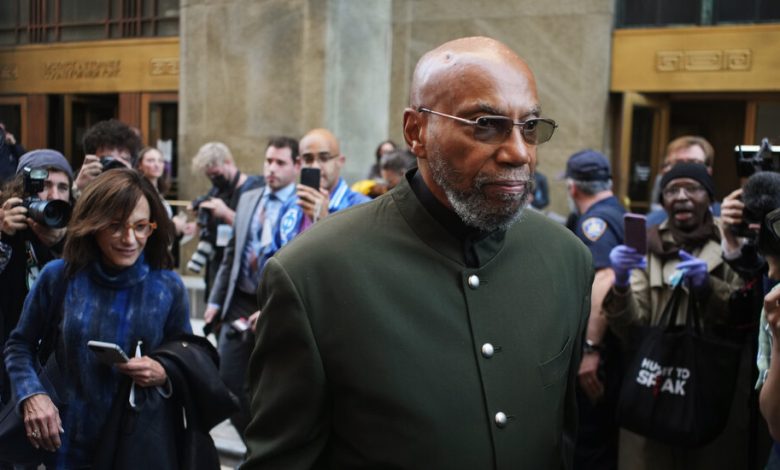Man Exonerated in Malcolm X’s Murder Sues U.S. Over His Conviction

A former member of the Nation of Islam who was exonerated in the assassination of Malcolm X filed a federal lawsuit on Thursday in a case that could shed new light on the F.B.I.’s role in one of the most notorious murders of the civil rights era.
The lawsuit brought by the man, Muhammad A. Aziz, who spent more than 20 years in prison and was cleared of the murder in 2021, accuses the F.B.I. of hiding evidence that suggested he played no role in the 1965 death of Malcolm X, a leading figure in the historic social movement to empower disenfranchised Black Americans.
Mr. Aziz’s suit, which names at least 19 bureau officials and seeks $40 million in damages, claims top officials, including J. Edgar Hoover, engaged in a “pattern and practice” of “causing miscarriages of justice.” Mr. Hoover, who is known to have ordered the surveillance and harassment of leaders of the civil rights movement, led the bureau for nearly half a century until his death in 1972.
A companion lawsuit was filed on behalf of the estate of Khalil Islam, who was also convicted of the crime and died in 2009, more than a decade before his exoneration.
Mr. Aziz, 85, and Mr. Islam’s estate previously received settlements totaling $36 million from New York City and the state to resolve lawsuits over the roles played by the police and the Manhattan district attorney’s office in their unjust convictions.
The mystery surrounding the assassination of Malcolm X deepened when Mr. Aziz and Mr. Islam were exonerated. Congress has long resisted calls from historians and activists for an investigation, keeping key details of the case hidden in the F.B.I.’s files.
David Shanies, a lawyer for Mr. Aziz and Mr. Islam’s estate, said he hoped the lawsuits would pry open long-held secrets about the assassination of Malcolm X, now officially an unsolved crime.
“Why would the F.B.I. intentionally cover up the evidence of these men’s innocence and knowingly let them take the fall?” he said. “What were they protecting?”
Representatives for the F.B.I. and the Department of Justice did not immediately respond to emails sent Thursday seeking comment on the lawsuits.
Malcolm X was shot and killed by three assailants on Feb. 21, 1965 as he was preparing to give a speech at the Audubon Ballroom in Upper Manhattan. Mr. Aziz and Mr. Islam were hastily arrested and, despite the absence of physical evidence and conflicting witness statements, convicted of first-degree murder.
At the time of their trial in 1966, the F.B.I. had amassed a “tremendous” amount of evidence that cast doubt on the men’s guilt and pointed to the actual perpetrators, according to the lawsuits, which were filed in federal court in Manhattan.
But the recent investigation that cleared them, which was conducted by their lawyers, the Manhattan district attorney’s office and the Innocence Project, found that the F.B.I. had deliberately withheld exculpatory evidence from the police and prosecutors, some of it at the explicit direction of Mr. Hoover.
The investigation also accused the bureau of ordering witnesses to the murder not to tell police investigators that they were F.B.I. informants.
One of the gunmen, Mujahid Abdul Halim, who was caught as he attempted to flee the ballroom, confessed at trial and said the other two men were innocent and that he didn’t know them. He later provided the names of the men he said were his co-conspirators when Mr. Aziz unsuccessfully appealed his conviction in 1977.
Instead, Mr. Aziz and Mr. Islam each spent more than two decades in prison and endured the stigma of being known as the killers of Malcolm X after they were freed in the mid-1980s.
The re-investigation found key pieces of evidence in the possession of law enforcement that corroborated Mr. Halim’s account of the killing, including the names of the other gunmen and two additional conspirators, their ties to a mosque in Newark, and where they had been sitting in the ballroom.
Scholars had unearthed some of the evidence many years earlier and an undercover police officer testifying in an unrelated case had shared an account that matched parts of Mr. Halim’s.
One critical new discovery was a memo from Mr. Hoover dated April 13, 1965, that instructed agents not to reveal detailed descriptions the agency had obtained from its informants describing the man who fired the fatal shot.
The descriptions implicated William Bradley, a former Marine gunner and lieutenant in the Newark mosque, on whom the bureau maintained “an extensive file,” according to the lawsuit. He denied any involvement in the assassination and died in 2018.
The officials named in Mr. Aziz’s lawsuit include Steven Edwards, a special agent who was recorded falsely telling prosecutors handling Mr. Aziz’s appeal in 1977 that the F.B.I. had no evidence supporting Mr. Halim’s account. The lawsuit also names August J. Micek, the bureau’s liaison to the New York Police Department’s counterintelligence unit who in an F.B.I. report from 1965 was said to have made sure investigators had no information on Mr. Bradley.
In addition to monetary damages, the lawsuit seeks to uncover Mr. Bradley’s possible ties to the F.B.I. According to the court papers, documents discovered during the re-investigation pointed to a “significant ongoing relationship” between him and the agency.
Lawyers also want to know what led investigators to Mr. Aziz and Mr. Islam. Both men were lieutenants in the Harlem mosque that Malcolm X had led before his split from the Nation of Islam. They have long said they were home with their wives on the day of the assassination.
Mr. Aziz was nursing a leg injury from a police beating, and he had taken three phone calls. The final call came from the Harlem mosque around 3 p.m.
Malcolm X, the caller said, had been shot.




